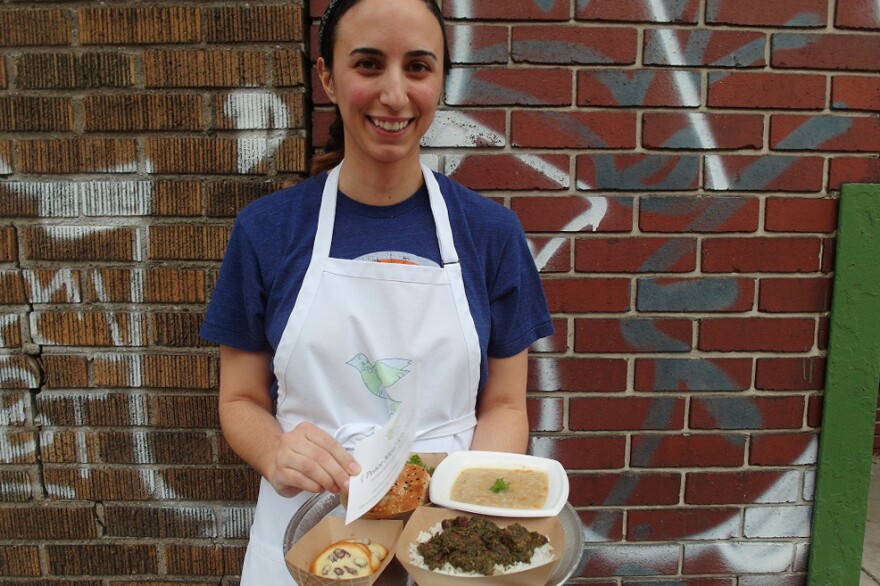When Mana Heshmati isn't working as an engineer, she's cooking traditional Iranian food through her "low-profit" Peace Meal Kitchen, a pop-up dining series based in Detroit.
It's a way to expose diners to her Iranian heritage and dispel misconceptions about the often misunderstood country.
She held her first pop-up in April to the delight of fans who ranged from the city's die-hard foodies to Iranian nationals who were craving a taste of home. Her dinners mostly feature traditional Persian cuisine, but she's also delved into other misrepresented regions, such as an Palestinian/Israeli event last fall.
But a mission that started as a culinary cultural exchange has shifted in the wake of President Trump's executive order barring travel from seven Muslim-majority nations.
"With the election," she says, "[the dinner series] is transforming into a platform to positively impact the community."
At a pop-up over the weekend, Heshmati's Peace Meal Kitchen filled a bar in Detroit's Eastern Market district with the herbaceous aroma of traditional ghormeh sabzi, a Persian beef stew with herbs and spinach.
Outside the door of the bar waited long lines of diners, all hungry to show their solidarity with immigrants affected by the executive order, which calls for restrictions on travelers from Iraq, Iran, Syria, Yemen, Sudan, Libya and Somalia. They feasted on sabze khordan, a salad of fresh herbs, radish and sheep feta served with fresh naan-e barbari, an Iranian flatbread, seer torshi, a side dish of aged pickled garlic, and other dishes.
In all, Heshmati and the event organizers raised more than $700, most of which is going to the ACLU of Michigan. They sold out of food within two hours.

Peace Meal Kitchen is just one of hundreds of food businesses across the country that are taking the opportunity to raise funds for the ACLU, which in the days since Trump made his announcement has raised more than $20 million nationally.
Metro Detroit is home to one of the largest Muslim immigrant populations in the country, including large concentrations of Iraqi, Yemeni, and Iranian immigrants, many drawn over the years to jobs in the automotive industry. More recently, parts of the area have welcomed a small number of Syrian refugees.
Among the diners at Saturday's event were Norris Howard and Latasha James, who heard about the dinner from a Facebook page.
"I grew up here and am so familiar with Middle Eastern food and culture," says Howard, 29. "To have something like this, we would be remiss to not support it."
James says she has Muslim-American friends who, even though they were born in the United States, have encountered instances of discrimination when wearing a traditional hijab.
"To hear the intolerance, the stigma, it's just so sad," she says.
Carolyn Anahid, 54, of suburban Troy, Mich., went to the dinner with her Iranian-born husband and their two adult daughters. While not normally the types to hit up the city's trendy pop-up scene, the family says Peace Meal Kitchen's cause seemed necessary.
"My daughter mentioned it, and that part of the profits would be going to the ACLU, so we immediately said we're going to be supporting this," says Anahid.
Anahid says her family's first reaction when Trump announced the travel restrictions was to check in with anyone they knew who might be impacted.
"For everybody who cares about this, there's that electric reaction of, 'Oh, my god, where is everybody, what's going to happen next?' "
For the Swedish-born, Iranian-descended Heshmati, using food as a means of discourse is a more organic, less intimidating way of addressing issues about identity and politics.
"Food has always been used as a bridging tool throughout many cultures throughout history," says Heshmati. "It takes out some of the stigma of some of the politics. It helps people reach a new level of understanding about a different culture. Food makes everything approachable."
Serena Maria Daniels is a freelance journalist based in Detroit.
Copyright 2021 NPR. To see more, visit https://www.npr.org.




